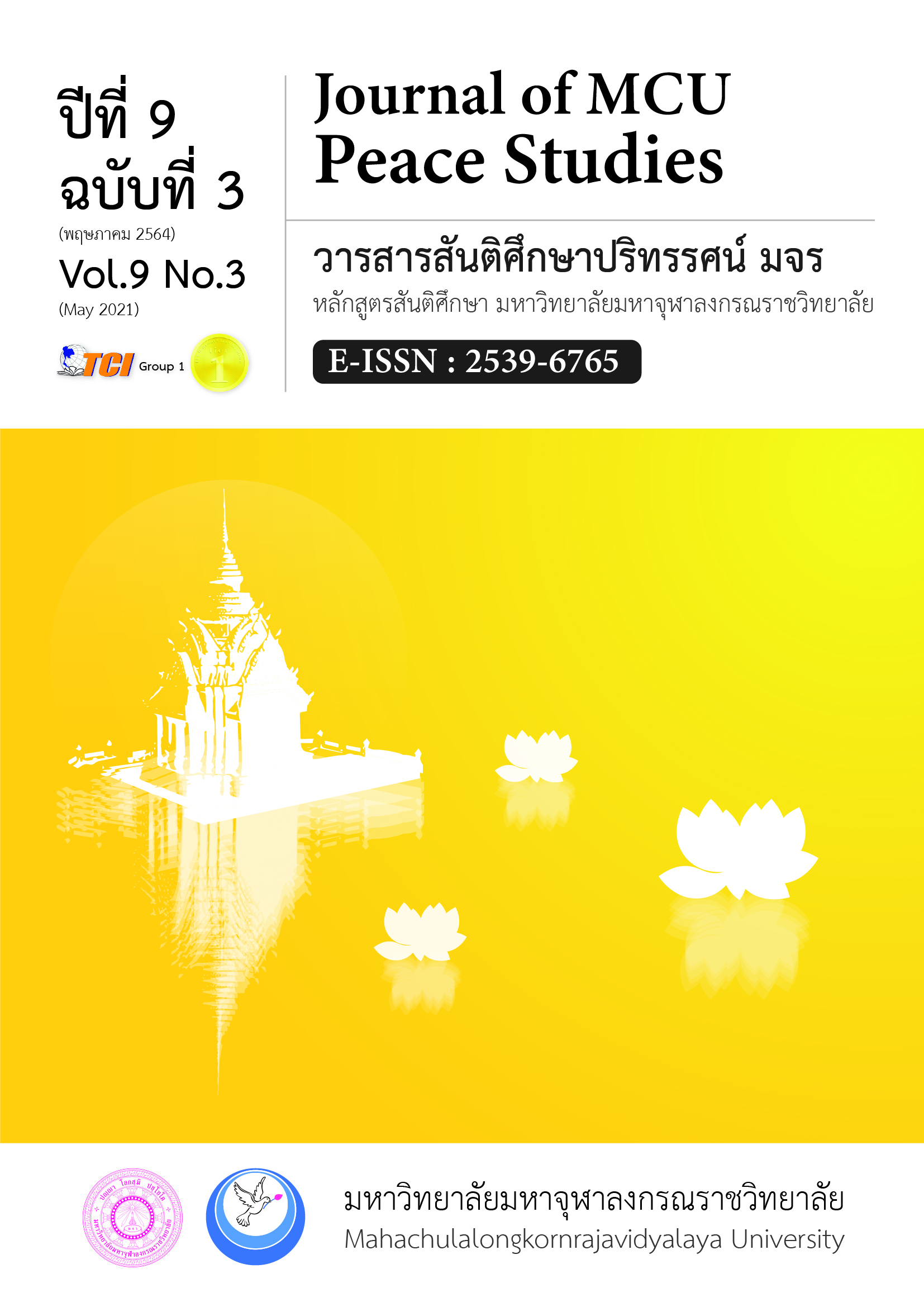The Development of Leader Competencies by An Innovative Model for Enhancing Local Peace Engineer Resulting in the Building of Peaceful Community
Main Article Content
Abstract
The objectives of this research were 1) to strengthen capacity of local leader to be the peace engineer to build the peaceful community in Patumthani Province and Ayuttaya Province and 2) to evaluate the curriculum and introduce the program of development to enhance the capacity of leader with the innovative model of enhancing local peace engineer. The study was divided into 4 phases, two experimental groups. A target group consisted of 25 local leaders in Phathumthani and 18 local leaders in Ayutthaya. A one group pretest – posttest design was also applied in the study. The research instruments included in-depth interview form, competency measurement form for local peace engineer, participatory observation, and reflection. The statistics used for content analysis were percentage, mean, standard deviation (S.D.), and dependent t-test. The results of the study found that 1) The participation construction have an impact to the community to learn based on the way of the culture of peace; 2) Communication bring about the peace and handle with the conflict creatively; 3) Self-conduct, as a role model, is the way of peace; 4) Awareness of peace within self; and 5) Having ideology of justice. For the guidance was applied to develop the curriculum is the threefold training, active learning, participation, and coaching. The study found that before and after attending the training found to have a difference at a statistical significance at the level of 0.05. The new body of knowledge acquired from the research results in a model called “3 powers for developing the local peace engineers” comprising: 1st power called the three learning principles leading to change according to Trisikkhā; 2nd power called the power for enhancing the competencies through Kalyāṇa-mittatā (good friends) in all 5 aspects; 3rd power refers to the 6 walking steps of learning the paradigm of peace by 6 steps of mindfulness.
Article Details
Views and opinions expressed in the articles published by The Journal of MCU Peace Studies, are of responsibility by such authors but not the editors and do not necessarily reflect those of the editors.
References
Pansuwan, A. (2014). The Development of Community Leader Characteristics in Accordance of Phranakhonsriayuthaya. (Doctoral Dissertation). Graduate school: Mahachulalongkornrajavidyalaya University. Ayutthaya.
Phra Dharmapitaka (P. A. Payutto). (2001). Buddhist methods of teaching. (8th ed.). Bangkok: National Education Agency.
Phra Promkhunaporn (P.A. Payutto). (2013). Thai Educational Philosophy in the Buddhist Sector: Education Leader. Bangkok: Phli Dhamm.
Phramaha Hansa Dhammahaso. (2018). The Integration of the Knowledge in Field of Peace for Developing Peace Building Process in Thai Society. Journal of MCU Peace Studies, 6(3), 1254-1266.
Sandmann, L. R., & Vandenberg, L. (1995). A framework for 21st century leadership. Journal of Extension, 33(6).
Sandmann, L. R., & Vandenberg, L. (1995). A framework for 21st century leadership. Journal of Extension, 33(6).
Comrey, A. L., & Lee, H. B. (1992). A First Course in Factor Analysis. (2nd ed.). New Jersey: Lawrence Erlbaum Associates.
Chantrawutikorn, S. (2019). Study and Development of a Training Model Based on Threefold Trainingto Strengthen Ethical Leadership for Executive Officers and Team Leaders in an Organization. (Doctoral Dissertation). Graduate school: Srinakharinwirot University. Nakhon Pathom.
Wattanapradith, K., Seethong, K., Rojjanauthai, S., & Areekul, C. (2018). The Holistic Development of Mind and Wisdom: Documentary and Research Synthesis (Research Report). Ayutthaya: Buddhist Research Institute of MCU.
Wattanapradith, K. (2016). Peace Community in the 26th Buddhist Century: Knowledge Learned from Peace Community in Conflict Areas. Journal of MCU Peace Studies, 6(Special), 13-24.
Wongyai, W., & Phatphon, M. (2019). The Coaching for competencies. Bangkok: Center for Innovation, Curriculum and Learning Leadership.
Singmatr, S., Meemana, P., & Kaewin, D. (2017). Leadership traits of the Executive in the 21st century. Retrieved December 21, 2020, from http://gs.rmu.ac.th/grc2017/fullpaper/file/PS-O-01.pdf.


